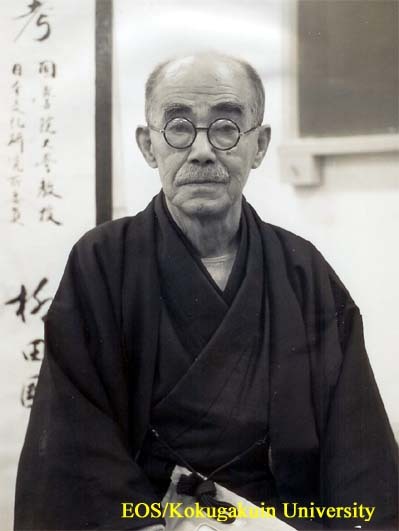- トップ
- Encyclopedia of Shinto
- Yanagita Kunio
Encyclopedia of Shinto
| Main Menu: | |
| Links: |
詳細表示 (Complete Article)
| カテゴリー1: | 8. Schools, Groups, and Personalities |
|---|---|
| カテゴリー2: | Personalities |
| Title | Yanagita Kunio |
| Text | (1875-1962) Founder of modern Japanese folklore studies. Born on July 31, 1875 to the Matsuoka family in Tsujikawa, Tawara Village, Jintō District, Hyōgō Prefecture, the sixth of eight brothers and sisters. His father Matsuoka Misao (otherwise known as Yakusai) was a proponent of National Learning (kokugaku) who had studied medicine and Confucianism and also served for a short time as a teacher. After studying agricultural administration at the Department of Political Science at the Faculty of Law of Tokyo Imperial University, Yanagita became a civil servant in the Department of Agriculture in June 1900, and then embarked on the path of a career bureaucrat. At the age of twenty-seven he became the adopted son of Supreme Court Justice Yanagita Naohira and changed his name to Yanagita Kunio. Three years later he married Taka, fourth daughter of the Yanagita family. In 1914 he was appointed chief clerk of the House of Peers, yet he resigned only five years later and thereafter entered into serious academic study. He served as an employee of the Asahi Shinbun newspaper and the Mandate Committee of the League of Nations. Yanagita authored many works on the folklore and popular religious beliefs of the Japanese people, and his scholarship can be classified into four periods: Period one: lyrical poet and agricultural bureaucrat (late Meiji era); Period two: inquiry into the traditions of mountain people and the assimilation of European folklore studies and ethnology (end of Meiji into the Taisho era); Period three: the formation of Japanese ethnology and the establishment of the Institute for the Study of Japanese Folklore, or the Minzokugaku Kenkyūjo (into the 1950s); Period four: research on the arrival of rice agriculture to the Japanese archipelago and the roots of the Japanese people, as exemplified by the study Kaijō no michi, or The Path over the Seas (postwar period). Yanagita died August 8, 1962, at the age of eighty-eight. His data collection and establishment of folklore studies methodology are widely known, yet his work with the greatest relevance to Shinto was mostly carried out in his third period. In order to identify a spiritual basis for the Japanese people in the postwar period, Yanagita composed three studies; Shintō to minzokugaku (Shinto and Japanese Folklore Studies), Nihon no matsuri (Festivals of Japan), and Senzo no hanashi (Tales of Our Ancestors). In Shinto and Japanese Folklore Studies, Yanagita wrote, "These are written with great care and dedicated as always with wishes for the providence from Suzu no Mori, the tutelary deity (ujigami) of my hometown, and from a humble Shinto scholar I greatly respect, none other than the spirit of my late father Matsuoka Yakusai." These and many other Yanagita works are collected in Teihon Yanagita Kunioshū (Standard Collection of the Works of Yanagita Kunio), in thirty-one volumes and five appendix volumes, published by Chikuma Shobō. —Mogi Sakae |




